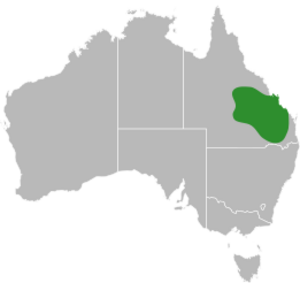Brigalow scaly-foot facts for kids
Quick facts for kids Brigalow scaly-foot |
|
|---|---|
| Conservation status | |
| Scientific classification | |
| Genus: |
Paradelma
|
| Species: |
orientalis
|
 |
|
The Brigalow scaly-foot (Paradelma orientalis) is a special kind of lizard. People also call it the Queensland snake-lizard. It belongs to a group of lizards known as legless lizards. These lizards look a lot like snakes. This unique creature lives only in Australia. It is the only species in its group, called Paradelma.
Contents
What Does the Brigalow Scaly-foot Look Like?
A Lizard That Looks Like a Snake
The Brigalow scaly-foot is a type of lizard that looks very much like a snake. It has a long body and a long tail. You won't see any legs on it. Instead, it has two small flaps. These flaps are like tiny leftover parts of hind legs.
Body and Scales
Its body is usually dark brown or gray. It has 18 to 20 rows of shiny scales. These scales give it a slight pale glow. There is a creamy patch right behind its head. After this patch, you can see a black bar. The scales on its head are large and look the same on both sides. Its belly has two wide, smooth rows of scales.
Head Features
The scales on its nose touch each other. You can also see a large ear hole near the back of its head. It has four small pores near its tail. From its snout to the base of its tail, it can be about 16 centimeters (6.3 inches) long.
Where Does It Live and What Does It Do?
Home in Queensland
This lizard lives in dry woodlands. It also likes rocky areas. You can find it in a part of southeastern Queensland, Australia, called the Brigalow Belt.
Night Life and Food
The Brigalow scaly-foot is a nocturnal animal. This means it is active mostly at night. During the day, it hides under rocks or fallen logs. This keeps it safe and cool.
What Does It Eat?
These lizards get most of their food from Acacia falciformis trees. They climb up the rough bark of these trees. Then they drink the sweet, nutrient-rich sap. They also eat small arthropods, like insects or spiders.
How It Reproduces
The Brigalow scaly-foot lays eggs. This means it is oviparous. A female usually lays two eggs at a time.
Protecting the Brigalow Scaly-foot
Current Status
The IUCN says the Brigalow scaly-foot is a Least Concern species. This means it is fairly common. It also lives in many suitable places.
Past and Present Challenges
However, the Brigalow Belt area has changed a lot. People have used the land for cattle grazing and farming. There have also been many wildfires. Invasive species like cats, pigs, and foxes also cause problems.
Population Changes
These issues might be causing the lizard's numbers to slowly go down. Scientists think there might have been many more of these lizards before Europeans arrived. The Brigalow scaly-foot was once considered Vulnerable. This was its status until 2013 by the EPBC Act. The IUCN also listed it as Vulnerable until 2018. Its status changed when scientists found it in more places than they first thought.


